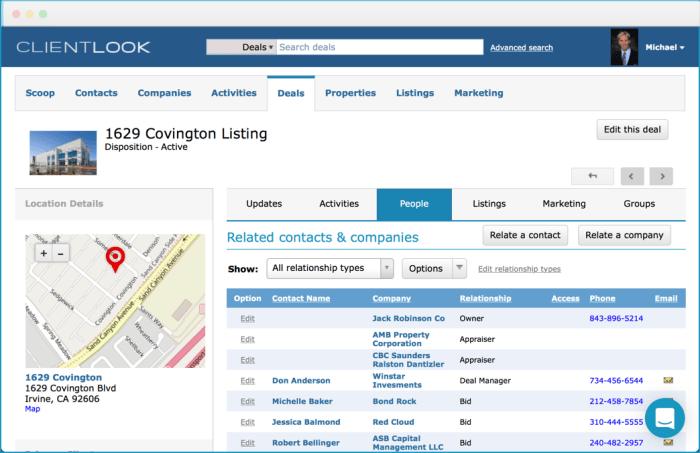The commercial real estate (CRE) industry is a dynamic and competitive landscape. Success hinges on efficient lead management, robust client relationships, and meticulous deal tracking. This is where Commercial Real Estate CRM software steps in, transforming how professionals manage their businesses and achieve greater profitability. This detailed guide explores the intricacies of CRE CRM software, outlining its key features, benefits, and considerations for choosing the right solution for your needs.

Source: verifiedmarketresearch.com
We’ll delve into various functionalities, explore different pricing models, and address frequently asked questions to equip you with the knowledge necessary to make an informed decision.

Source: clientlook.com
Understanding the Power of Commercial Real Estate CRM Software
A Commercial Real Estate CRM (Customer Relationship Management) system is a centralized platform designed to streamline and optimize all aspects of the CRE sales cycle. Unlike generic CRM solutions, CRE-specific software is tailored to the unique requirements of the industry, offering features that address the complexities of property listings, tenant management, and deal closings. This specialization translates to increased efficiency, improved client relationships, and ultimately, a higher return on investment.
Key Features of a Robust CRE CRM, Commercial real estate crm software
- Lead Management: Capture, qualify, and nurture leads effectively. Track interactions, assign tasks, and monitor progress through the sales pipeline. Integration with online property listings is crucial.
- Contact Management: Maintain detailed profiles of clients, tenants, brokers, and other stakeholders. Store vital information like contact details, communication history, and property preferences.
- Property Management: Manage property listings, track key details (square footage, lease terms, amenities), and showcase properties visually through integrated media galleries.
- Deal Tracking and Management: Monitor the progress of deals from initial contact to closing. Manage tasks, deadlines, and relevant documents within the system.
- Document Management: Store and securely access all crucial documents related to properties and transactions, ensuring easy retrieval and collaboration.
- Reporting and Analytics: Generate insightful reports to track key metrics such as lead conversion rates, deal closure times, and sales performance. This data-driven approach allows for informed decision-making.
- Marketing Automation: Automate marketing tasks, such as email campaigns and social media updates, to nurture leads and enhance brand visibility.
- Integration Capabilities: Seamlessly integrate with other essential business tools, including email marketing platforms, accounting software, and property listing websites (like LoopNet, CommercialCafe, etc.).
- Mobile Accessibility: Access the CRM from any device, allowing for on-the-go management of leads and deals.
Benefits of Implementing a CRE CRM System
The advantages of using a dedicated CRE CRM are numerous and impactful. These benefits extend across various aspects of your business:
- Improved Lead Management: No more lost leads or missed opportunities. Efficient tracking and nurturing ensures higher conversion rates.
- Enhanced Client Relationships: Personalized communication and proactive follow-up strengthens client relationships, fostering loyalty and repeat business.
- Increased Sales Productivity: Streamlined processes and automated tasks free up valuable time, allowing agents to focus on closing deals.
- Better Deal Management: Reduced errors and improved transparency in deal tracking minimize risks and accelerate the closing process.
- Data-Driven Decision Making: Access to real-time data and insightful reports empowers strategic decision-making, optimizing business operations.
- Improved Collaboration: Centralized access to information fosters better teamwork and communication among team members.
- Scalability and Flexibility: Choose a system that can grow with your business, adapting to changing needs and increasing workloads.
Choosing the Right Commercial Real Estate CRM: Key Considerations
Selecting the optimal CRE CRM requires careful consideration of several factors:
- Business Size and Needs: A small brokerage will have different requirements than a large firm with multiple offices and agents.
- Budget: CRM software comes with various pricing models, from subscription-based plans to one-time purchases. Consider your budget and choose a solution that offers value for money.
- Features and Functionality: Prioritize the features that are most relevant to your business operations. Don’t overspend on functionalities you won’t use.
- Ease of Use and User Interface: Choose a system that is intuitive and easy to navigate, minimizing the learning curve for your team.
- Integration Capabilities: Ensure the CRM integrates seamlessly with your existing business tools and platforms.
- Customer Support: Reliable customer support is crucial, particularly during implementation and troubleshooting.
- Security and Data Privacy: Prioritize a CRM that offers robust security measures to protect sensitive client and property data.
Popular Commercial Real Estate CRM Software Options
(Note: This section would list popular CRM options with brief descriptions. Due to the constantly evolving market and potential for bias, specific product recommendations are omitted. Readers should research current market offerings independently.)
Pricing Models for Commercial Real Estate CRM Software
CRE CRM software typically follows various pricing models:

Source: limitlessreferrals.info
- Subscription-based: Monthly or annual fees based on the number of users or features.
- Per-user licensing: A fee per user accessing the system.
- One-time purchase: A single upfront payment for perpetual use (often with ongoing support fees).
Frequently Asked Questions (FAQ)
- Q: What is the average cost of CRE CRM software? A: Costs vary significantly based on features, users, and pricing model. Expect a range from hundreds to thousands of dollars annually.
- Q: How long does it take to implement a CRE CRM? A: Implementation time depends on the complexity of the system and your business needs. It can range from a few weeks to several months.
- Q: Can I integrate my existing property listings with a CRE CRM? A: Most CRE CRMs offer integration capabilities with popular property listing websites.
- Q: What kind of training is required to use CRE CRM software? A: Most vendors provide training resources, including online tutorials, webinars, and dedicated support.
- Q: Is my data secure in a CRE CRM? A: Reputable vendors prioritize data security with measures like encryption and access controls.
Conclusion
Implementing a Commercial Real Estate CRM is a strategic investment that can significantly enhance your business’s efficiency, productivity, and profitability. By carefully considering your needs, researching available options, and choosing a solution that aligns with your budget and goals, you can unlock the full potential of your CRE operations. Take the time to explore different platforms, compare features, and select the CRM that best suits your specific requirements.
Call to Action
Ready to transform your commercial real estate business? Start exploring CRE CRM solutions today and experience the benefits of streamlined operations and enhanced client relationships. Contact us for a free consultation to discuss your specific needs and find the perfect CRM for your success!
FAQ Compilation: Commercial Real Estate Crm Software
What are the key features to look for in a commercial real estate CRM?
Essential features include contact management, property management, deal tracking, reporting and analytics, and integration with other business tools.
How much does commercial real estate CRM software typically cost?
Pricing varies widely depending on features, user numbers, and vendor. Expect monthly subscription fees ranging from a few hundred to several thousand dollars.
What is the best way to implement a CRM system in my brokerage?
Start with thorough planning, including needs assessment, staff training, and data migration. Consider phased implementation to minimize disruption.
How can I ensure my data is secure in a CRM system?
Choose a vendor with robust security measures, including encryption, access controls, and regular security audits. Review their privacy policy carefully.
